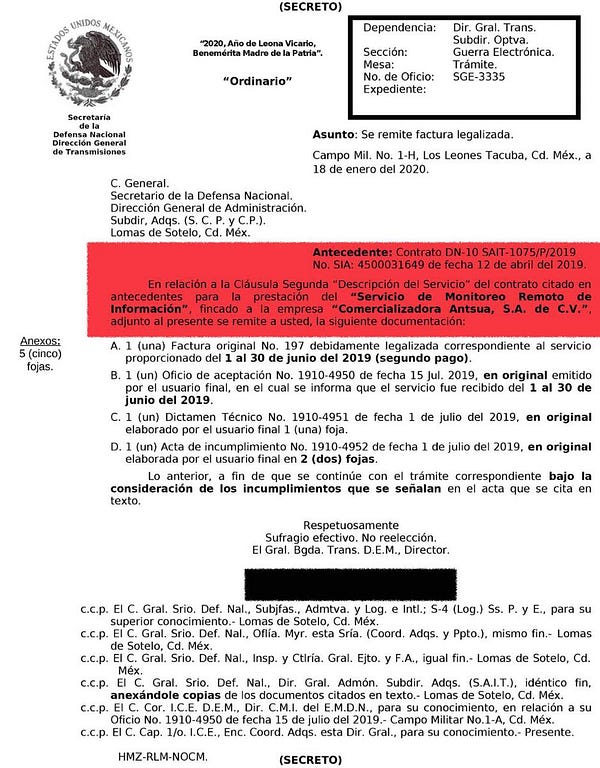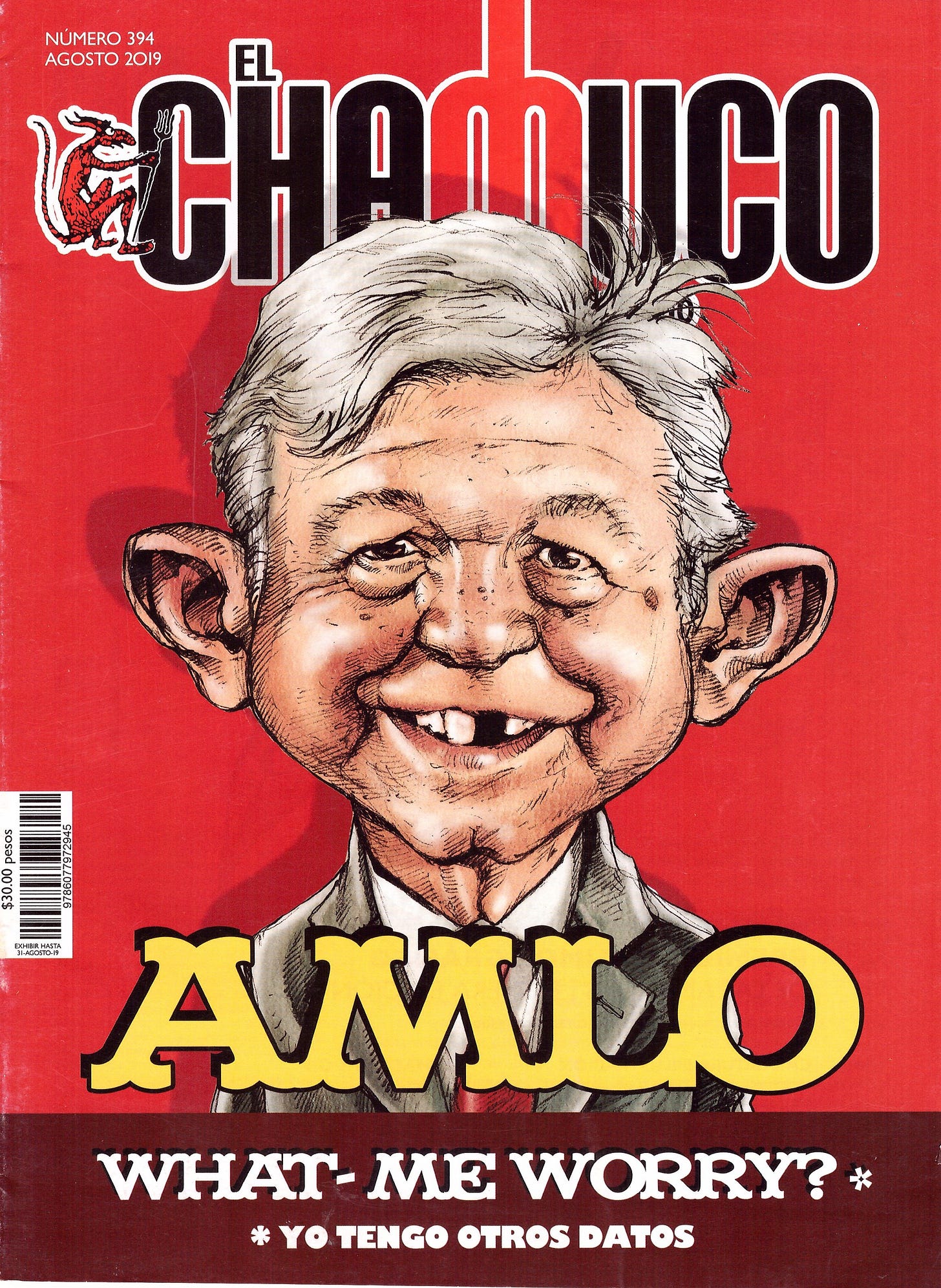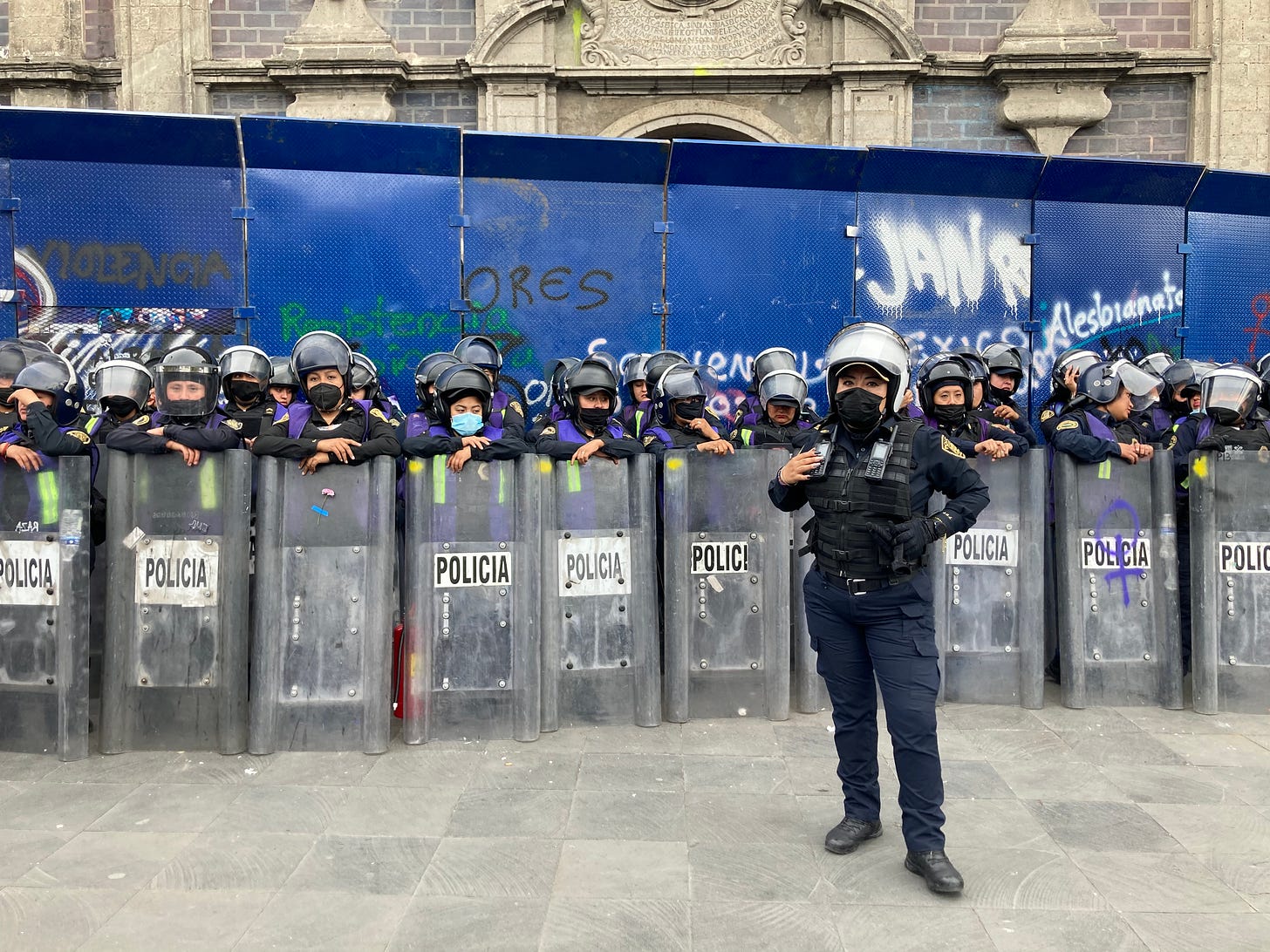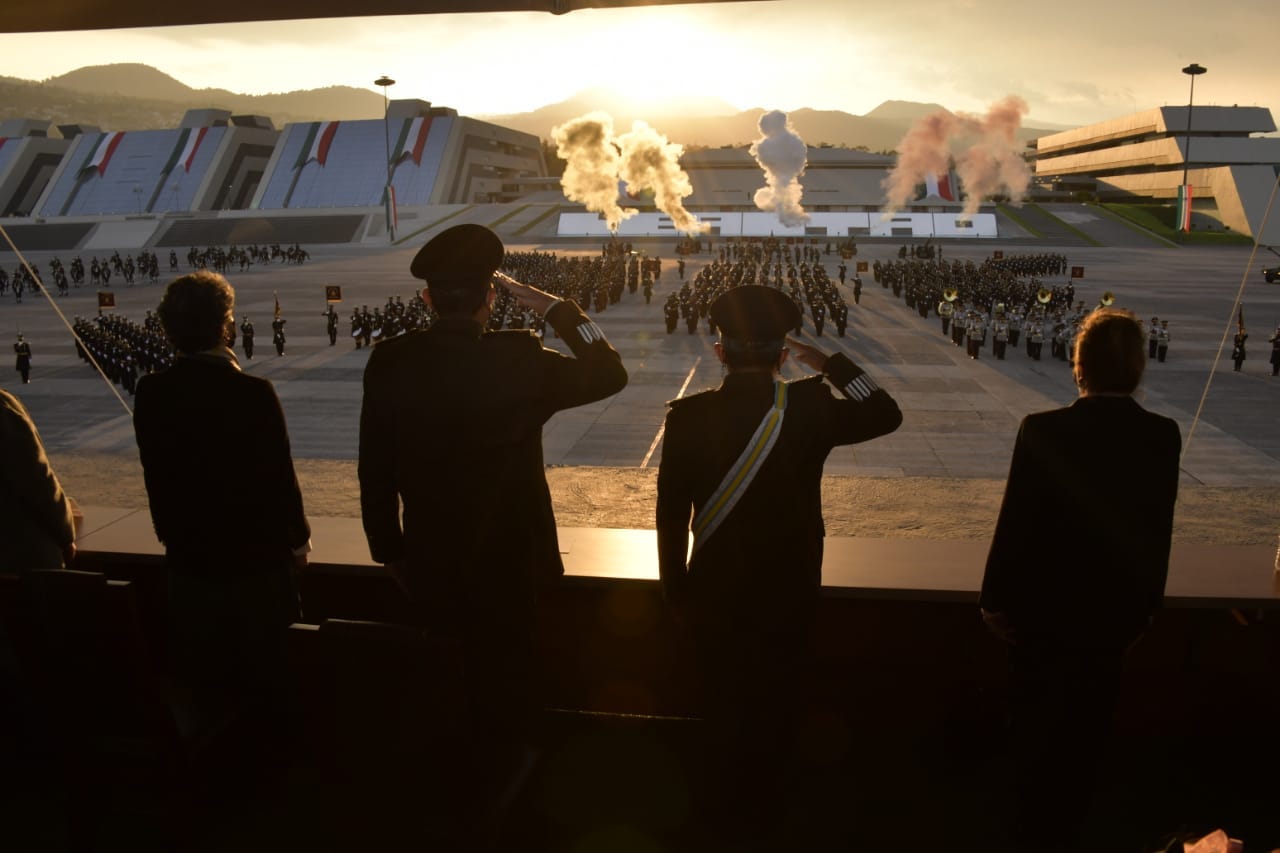#SedenaLeaks spills the secrets of Mexico's most hermetic institution
Hackers got access to the Defence Secretariat's servers; the results are proving unflattering and potentially explosive
Mexico’s interior minister appointed men allegedly part of the Jalisco New Generation Cartel to top security positions in Tabasco state, where he was governor from 2018 to 2021. A soldier sold weapons from an army base, arming drug cartels at the same the Mexican government was filing suit against U.S. gunmakers for allegedly fuelling mayhem south of the border. The army also surveilled the burgeoning feminist movement, which has taken to the streets in mass protests across the country over a lack of action on gender violence.
The revelations were part of a data dump from the so-called #SedenaLeaks information hacked from the Defence Ministry (SEDENA) – in a security breach shining a spotlight on one of Mexico’s most secretive and hermetic institutions: the military.
It threatens to embarrass President Andrés Manuel López Obrador, who has leaned heavily on the military throughout his administration – tasking the armed forces with everything from building and operating airports to running the customs service and seaports to managing a national park and taking tourists to the Islas María (a former prison colony) – while portraying soldiers as somehow incorruptible and less prone to graft and grifters than civilians.
But it especially exposed the long-suspected collusion between drug cartels and state actors – including politicians, police and soldiers – at a time when López Obrador promotes a soft-on-crime policy (oft-stated as “hugs, not bullets”) and shows more scorn for civil society than criminal groups.
What? Me worry?
The leaks started with revelations on the president’s health. AMLO, as the president is known, acknowledged he suffered thyroid issues and gout and suffered a heart issue so severe that it required him to be airlifted from his ranch in Chiapas state to Mexico City’s military hospital. The airlift – from a president who shows his preference for parsimony by flying discount airlines and avoiding government jets – was not previously publicized. But AMLO’s cardiac issues were long known. He suffered a severe heart attack in 2013, which was treated a renown private hospital.
AMLO responded with his usual pattern of portraying bad news as overstated and no big deal. He also figured people would see it as an invasion of privacy – ironic, because AMLO laundered private tax information on journalist Carlos Loret de Mola, the reporter first spilling the #SedenaLeaks. He said at his morning press conference:
“I almost couldn’t sleep due to the worry, thinking that this is the big news. Well, they don’t have anything. … Our adversaries are wrong thinking that this is going to damage us. People have rejected this. They see it has an invasion of privacy, a lack of respect and a low blow.”
AMLO also insisted the leaks would reveal nothing that was not already known.
He then returned to an old trope of playing a campy 80s tune from Chico Ché y la Crisis, !Uy que Miedo! (Oh, How Scary!) He did the same in July after the United States and Canada filed for trade dispute talks under the USCMA agreement, alleging AMLO’s nationalistic policies undermined foreign companies’ investments in clean energy.
Political columnist Salvador García Soto in his El Universal column said of the president’s political communications:
“Chico Ché songs have become a substitute for the Mexican president’s discourse. When he doesn’t have something coherent to say or doesn’t want to commit to an issue, which bothers him or makes him uncomfortable, but he also wants to minimize or banalize, López Obrador returns to the songs of his fellow Tabascan with their tongue-in-cheek lyrics and tropical rhythms. Chico Ché worked as a response to the United States (trade complaint), though he later retracted and publicly accepted that Washington’s complaint pained him. (Now it) served to hide the president’s fury and fear at the massive hacking of confidential military documents suffered by the Defence Ministry.”
Guacamaya hacktivists
AMLO’s experience with radical transparency comes barely two weeks after he feted Wikileaks founder Julian Assange – who the Mexico president called “the Quixote of our time,” while hosting Assange’s family at Mexican independence cerebrations.
A collective known as Guacamaya – macaw, in Spanish – claims to have taken more than six terabytes of data in the form of some four million emails from SEDENA servers. The collective has perpetrated hacks in other Latin American countries, including Chile, Colombia and El Salvador, targeting defence ministries, mining and oil companies and environment ministries – while claiming to be anti-imperial and pro-environment.
Interior Minister Implicated
Among the most explosive revelations in the #SedenaLeaks dump: military intelligence accused Interior Minister Adán Augusto López of appointing three alleged members of a cell belonging to the Jalisco New Generation Cartel (CJNG) to top public security posts in swampy Tabasco state – where López, an AMLO partisan, was governor from 2018 to 2021. (AMLO is also a Tabasco native.) All three of the men remain in their positions. López, one of three main contenders for the 2024 presidential nomination of AMLO’s MORENA party, has not publicly commented on the accusation.
Military intelligence said the men were alleged to belong to a CNJG cell known as La Barredora, which is supposedly involved in huachicoleo – the illegal syphoning of petroleum products from Pemex pipelines.
Hernán Bermudez Requeña, Tabasco’s public security secretary, denied the accusations, telling the newsweekly Proceso that the cell known as La Barrera was “inexistent.”
Cártel del Noreste in Veracruz
Military intelligence warned that in the Gulf Coast state of Veracruz – Mexico’s second-largest by population – “The heads of the state public security secretariat, state police and Fuerza Civil (an elite police unit) provide protection to the Cártel del Noreste.” It also alleged that the state government allowed the cartel – a group which splintered from Los Zetas in 2014 – entry to the state.
MORENA Gov. Cuitláhuac García denied the accusations, saying, “I authorize them to investigate me, my family, (my) secretaries. … We have nothing to hide.”
Weapons for sale

A leaked email spoke of a soldiers allegedly selling weapons to a criminal group from Campo Militar 1 – SEDENA headquarters in Mexico City. The email was published by anti-graft group Mexicans Against Corruption and Impunity, which wrote:
“In an intelligence report dated June 10, 2019, it is detailed that the SEDENA was aware that a soldier offered tactical equipment, weapons and grenades, in addition to providing information on mobility and operations of the armed forces to a drug cartel cell, which is based in Tejupilco, State of Mexico.
‘On May 31 (2019), the military offered operators of the criminal group 70 fragmentation grenades at a cost of 26,000 pesos each; the criminal cell confirmed the purchase of eight of them, which were delivered in Atlacomulco, State of Mexico.’”
The criminal group, according to intercepted calls, asked the soldier for ammunition and clips for AK-47, R-15 and R-50 riles.
Military refused to be vaccine guinea pigs
Mexico’s Science an Technology Council (CONACyT) – headed by an AMLO loyalist who regularly rails against “neoliberal science” which she claimed, “produced the most splashy, and perhaps most useless advances, like reaching the moon” – developed an Covid vaccine called “Patria,” which it wanted to test on soldiers. The military, however, objected, saying in a leaked email that its collaboration agreement with CONACyT did not include developing technology and that soldiers had already been vaccinated.
Feminist ‘threat’
A report titled “Mexico City Social and Criminal Agenda,” listed feminist collectives as public security threat over protests in the capital. “The activism in the city by feminist collectives has become extremely radical with the painting of emblematic monuments, aggressions against men in their protests, along with the robbery and destruction of various businesses with the goal of demanding measures against gender violence.”
It listed groups such as Las Brujas del Mar (The Sea Witches), a Veracruz-based feminist collective, which rose to prominence with its call for a national day without women in March 2020 – a call, which was heeded by many women, and garnered international attention. Organizers cited the grim statistic of 10 women murdered daily in Mexico – crimes, which usually go unpunished.
SEDENA cited the 2017 murder of UNAM student Lesvy Berlín Rivera as the “perfect storm” for triggering the protests. Mexico City investigators claimed Lesvy committed suicide on the UNAM campus – despite being found dead with a telephone cord wrapped around her neck – “then charged her boyfriend for failing to intervene,” according to NACLA.
For his part, López Obrador has repeated protesting women and feminists as “conservatives” or having been co-opted by conservatives (his epithet for political opponents), while progressives in Mexico express bitterness over having supported the president – who won their votes by promising to appoint a former Supreme Court judge Olga Sánchez Cordero as interior minister. (She was part of the court that upheld Mexico City’s 2007 abortion law.)
Feminists, renegade teachers, parents of kids with cancer considered threats to new airport – on par with drug cartels, international terrorists
An army list on threats to the new Felipe Ángeles International Airport (AIFA) on the northern outskirts of Mexico City drew disbelief and ridicule as it put feminist collectives, renegade sections of the teachers union (who often protest), students from the Ayotzinapa normal school, campesino groups and the parents of children with cancer – who have blocked access to Mexico City’s main airport over a lack of chemotherapy meds (thanks to AMLO’s procurement policies) – on the level as the CJNG and Hezbollah and lower than other drug cartels. Only Al Qaeda was considered a higher threat to the facility.


Fentanyl pills flowing through Sinaloa


SEDENA reported 76% of its seizures of fentanyl pills between December 2018 and January 2020 originated in the state of Sinaloa – home of the eponymously named cartel, which has come to dominate the market. The cartel mostly moved its illegal merchandise, according to SEDENA, while most of the chemical precursors arrived from Asia via the Mexico City International Airport.
Less marijuana, heroin poppy eradications
Mexico’s military has eradicated far fewer illegal crops in recent years – the product of marijuana decriminalization in the United States, according to SEDENA. Soldiers eradicated only 84 hectares (207.5 acres) of marijuana over the first five months of 2022. It also eradicated 55% less marijuana during the first full three-and-a-half years of the AMLO administration, when compared to the previous period of his predecessor Enrique Peña Nieto.
According to the SEDENA document published by Latinus, some 46,000 hectares (113,000 acres) of heroin poppies have been eradicated – 35,000 hectares less, when compared to the same period of the Peña Nieto government. SEDENA attributed the drastic reduction in heroin poppy eradication to the rise of synthetic drugs – which has diminished demand for heroin and driven down prices.
An army airline
AMLO has tasked the army with building and/or operating four Mexican airports: AIFA, Tulum, Chetumal and Palenque. SEDENA – which includes the air force – has subsequently proposed launching a new airline, which would be based at the woefully underused AIFA and include the now-parked presidential aircraft as part of its fleet.
The president confirmed the leaked info and has proposed the new airline be called “Mexicana de Aviación,” the Mexican carrier which went bankrupt in 2010 and ceased operations. A spate of discount carriers launched in the five years prior to Mexicana’s demise – though Interjet, one of the first, has itself gone bust. Carriers Volaris and VivaAerobus, however, have thrived.
The federal government bought both Mexicana de Aviación and flag carrier Aeromexico after the 1994 peso crisis, but re-privatized the airlines in the 2000s. The track record of state-owned airlines in Latin America is dismal, as Simply Flying observed:
In the Americas, there’s a long-standing tradition of State carriers being unable to record net profits, including examples such as Aerolíneas Argentinas (Argentina) and TAME (Ecuador) in the recent past.
The new airline would include the presidential aircraft – a 787, which AMLO has long criticized as a flying palace and symbol of past presidents’ profligacy. He often promised to sell it, but has been unable to find a buyer. It’s been such an important prop in his populist politics that he organized a lottery in 2020 with the 787 as the main prize, though ultimately ended up awarding cash prizes instead.
In a telling tale of how the lottery turned out, a dilapidated school in rural Chiapas ended up holding a winning ticket worth 20 million pesos (roughly $1 million). Parents had planed to fix the facility and make improves around town. But a criminal group demanded part of the proceeds and eventually forced 28 indigenous Tzeltal families to flee.
Defence secretary ducks questions, congression committee
The national defence commission of Mexico’s lower house of Congress called Defence Secretary Gen. Luis Cresencio Sandoval to speak about the SEDENA leaks. But Sandoval refused. SEDENA instead convened a meeting with the commission for Oct. 18 at army headquarters, according to the newspaper Reforma – with no word on whether the encounter would be accessible to the public or broadcast.
The secretary’s refusal to appear before Congress – and set the conditions for a meeting on his terms – reinforced perceptions that Mexico’s military actively resists civilian oversight. And it comes as AMLO increasingly depends on (and defends) the armed forces as a partner in power.
As Vidulfo Rosales, a lawyer for the families of the 43 missing Ayotzinapa normal schools students, told this newsletter, “The army is like the immaculate.” He continued:
“In Mexico, the army has meta-constitutional powers. Its powers go beyond what the constitution establishes. The constitution establishes that the commander in chief of the armed forces is the president … (but) the power of the army goes beyond, or is parallel to the presidential power.”

ARMY CLOSES RANKS ON AYOTZINAPA CASE
AMLO promised to resolve the case of the missing 43 students, who were kidnapped in September 2014 by police acting in cahoots with the Guerreros Unidos drug cartel and never seen again. He also promised there would be no impunity. He formed a truth commission and appointed a special prosecutor.
The truth commission produced a report in August, calling the event, “A state crime,” in which the police, soldiers, investigators and public officials – often in communication with criminals – either participated in the attack or helped cover it up. It also questioned the army, which had an informant among the students, but acted passively as the attack occurred – even as it knew the atrocity that was unfolding.
Another commission of experts sponsored by the Inter-American Commission on Human Rights reported in late September that they had been denied access to SEDENA’s intelligence files – despite orders from López Obrador. The experts also found evidence of messages between soldiers and alleged cartel members.
Rosales, the families’ lawyer says the truth commission made progress in the investigation. But then the cash collided with Mexico’s military – as Alejandro Encinas, the deputy secretary for human rights, announced the arrest of an army colonel accused of ordering the execution of six students being held in a warehouse.
At that point, Rosales said, the political will to resolve the case disappeared, while analysts say AMLO faced a stark choice: back the military or continue with the investigation.
A torpedoed investigation
More than eighty arrest warrants were issued in August after the release of the truth report on Ayotzinapa. But, mysteriously, the federal prosecutor’s office asked a judge to vacate 21 of those arrest warrants – 16 of which were for soldiers. Then the special investigator, Omar Gómez Trejo, resigned. The president attributed the investigation to Gómez Trejo disagreeing with “the procedures for approving the arrest warrants.”
AMLO insisted the investigation was open and would continue. But he also defended the army, saying critics were using the Ayotzinapa case to “provoke rebellion in the army.”
SENDENA DEPLOYS SPYWARE

AMLO has long insisted his administration doesn’t spy on anyone. But a report from Citizen Lab at the University of Toronto, along with Red en Defensa de los Derechos Digitales (R3D), ARTICLE 19 México y Centroamérica, y SocialTIC, found three cases of Pegasus spyware (from Israeli firm NSO group) planted on the cellular devices of two journalists and the director of a human rights center in Nuevo Laredo. The three targets were all targeted during this presidential administration, “while working on matters related to human rights violations by the armed forces,” according to R3D.
Citizen Lab in 2017 documented widespread use of Pegasus spyware by the Peña Nieto administration. Targets included the journalists who exposed his wife’s purchase of a $7 mansion from a crony contractor, the director of an anti-graft group and even activists lobbying for a soda tax. It was later revealed that 50 people linked to AMLO – including family – were were spied on with NSO software.
López Obrador said in 2021 that the Mexican government no longer uses Pegasus and hasn’t purchased it. But investigators found SEDENA purchased software from a known NSO supplier in 2019. Citizen lab confirmed the use of NSO software on phones belonging to: Raymundo Ramos, who has denounced alleged abuses of the Mexican military (especially the navy) in Nuevo Laredo; Ricardo Rafael, a journalist (and former nephew of president Miguel de la Madrid); and a journalist from independent news organization Animal Politico. (Both Raphael and Animal Political critically cover SEDENA.)


AMLO flat out denied any use of spy software on journalists and activists. In a testy exchange with a reporter from Animal Politico at his Oct. 4 press conference (check the tweet at the start of this section) López Obrador doubled down on the denial:
Q: “The question, president, is if you knew of this purchase by SEDENA. And who authorized the army’s spying?”
A: “No. It’s not true that journalists and opponents are spied on. We’re not the same as our predecessors. No, it’s not true. I made a commitment that nobody was going to be spied on, no opponent. So if you have evidence, present it.”
The exchange continued:
Q: “Did you know about this specific purchase, what is remote monitoring and what does espionage mean, President?”
A. No.
Q: So, the Armed Forces did it without informing you?
A. It’s that they have intelligence work that they carry out, not espionage, which is different. We do not spy on opponents and what our adversaries are looking for is to say we’re the same as those who previously governed, and we are not the same.”











